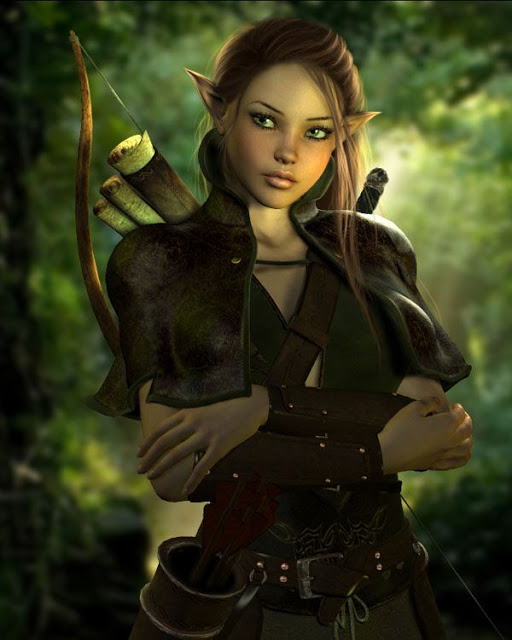Elf Race & Physiology
Elves are the oldest dominant humanoid species on Earth other than human beings. The origin of elves remains to this day outside of common knowledge; such remains a mystery to elven cultures as well. It is believed that elves arrived from "the west," but since this same legend is described by elves in Europe, the New World and Asia, it cannot be said precisely where this "west" begins. Most likely, the ambiguous term is used to describe another plane of existence, from whence elves came, setting foot upon the Prime Material some 35,000 years ago.
The most familiarly known elven culture is that of Ulthua, situated between Scandinavia and Bjarmaland on the coasts of the Barents and White seas. Once a military-based empire some 2,000 years ago, for more than five centuries these elven peoples have adopted a philosophy of peace with their neighbours. There has been no notable conflict between elves and outsiders since the Swedish Third Crusade of 1293-1295.
Colonialists of the Americas have described encounters with a less organized and civilized race of elves, commonly called "wood elves," dwelling among the Appalachian cordillera and valleys beyond. Though plainly elves in appearance, these are shorter, with pale grey eyes and more hunter-green in colour. While civilized and skilled, the wood elves of America are far less culturally advanced than the winter elves of Europe.
A third group, more obscure, is known to occupy the coasts of the Bering Sea, north of Kamchatka. Only a little is known about the elves of Anduin. Because they dwell in arctic lands like the Ulthuans, it's believed that these elves form a primitive culture — and may be part of the tribes from which the elves from Ulthua originated.
Players are able to choose the elven race as an option for their characters, the choice being an elf of the winter elven background. Players cannot choose a wood elf as a character option. Some advantages described below apply to all elves, but players do not receive any sage abilities from this race that are described below.
Appearance
Elves average five feet in height, with slender, lean bodies. Most males weigh about 100 lbs., but rare males are as tall as tall as five foot eight or nine, weigh up to 180 lbs. Female elves average 80 lbs. An elf's fine hair varies from ginger and black, though some possess locks of wheaten blonde, silver grey or platinum blonde. Their eye colour is usually a wide range of the colour blue, but the most charismatic may have eyes that are ultramarine and even violet in colour. Their skin colour is pale Nordic.
Advantages
Player characters choosing this race gain a +1 dexterity and a -1 constitution.
Elves are naturally effective when using long and short swords, receiving a +1 to hit with these weapons. Likewise, elves receive a +1 to hit bonus when using any kind of bow. Elves don't receive this bonus when using a two-handed, bastard or broad sword, nor when using a crossbow.
Elves are skilled assassins, clerics, fighters, mages, rangers and thieves. Their presence of mind permits a +1 saving throw against charm spells for every 3½ points of intelligence they possess. For example, an elf with an intelligence of 15 would have a +4 saving throw.
Elves also possess infravision, being able to see in the dark with relative clarity. Because of their experience moving through the outdoors, non-player character elves possess a natural stealth ability. Contrary to popular belief, elves don't possess any special abilities to locate secret and concealed doors.
See also,
Aging
Bestiary
Character Race Options
Demi-Humans
Player Characters
